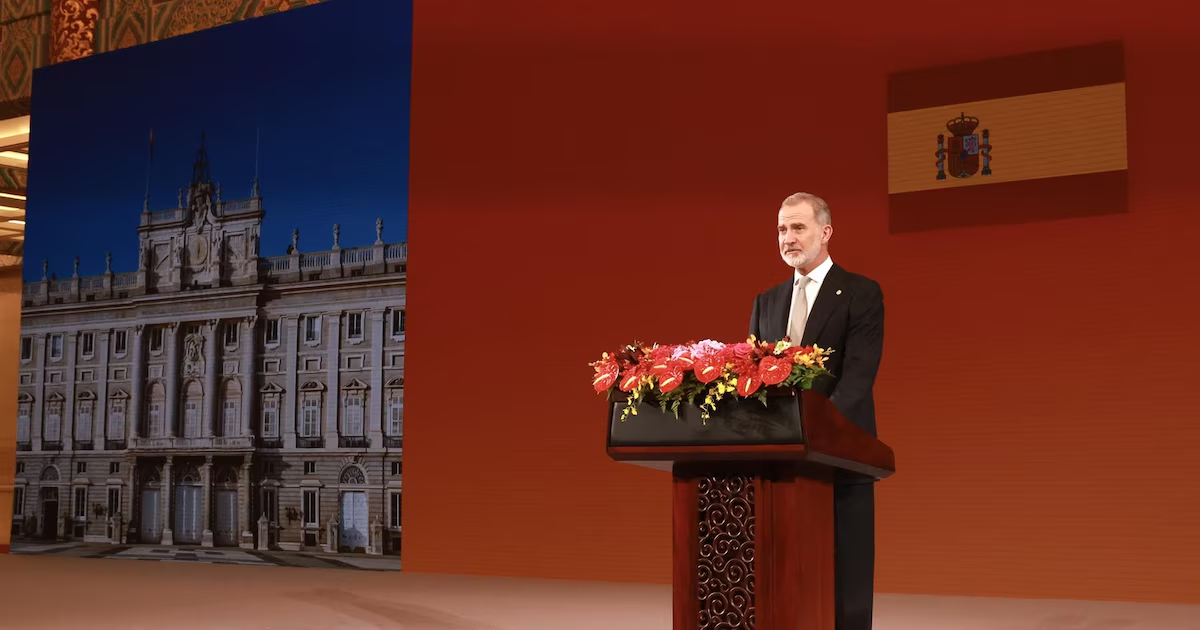
King Felipe VI concluded his state visit to China with Queen Letizia by reiterating the importance of maintaining close ties and “fruitful dialogue” with China, but noted that this does not mean Spain will abandon its defense of values such as democracy and human rights under any circumstances.
It was only during the final stages of his three-day state visit that the king addressed, at least in public, respect for human rights, one of the most sensitive issues in relations with the Asian giant. The Government insists that all matters of interest, including this issue, are always addressed in the contacts regularly maintained with the Chinese Government and recalls that the EU maintains a special dialogue on this issue.
In line with the message he delivered the day before with Chinese President Xi Jinping, Premier Li Qiang, and National People’s Congress President Zhao Leji, King Felipe VI reiterated to Spanish society that “China is today a major player on the international stage, and great challenges and changes are underway.”
The King further added that “Spain maintains a fruitful dialogue with Spain, both in European countries and in Spain itself,” pointing out that: “With firm confidence in who we are as a nation, a modern, cooperative, creative, open and committed Spain, we will continue to uphold our values of democracy, international law, human rights and multilateral cooperation in the face of the great challenges of our time.
Satisfied with the result of the trip
The king declared as the group departed that he was “pleased with the progress of this first state trip,” which began in Chengdu on Tuesday, and that it was “particularly tense.” “Our visit represents a renewal of our common will to continue building pragmatic relations based on dialogue, mutual respect and interests, friendship, and broad and ambitious cooperation,” he concluded.
“Spain’s presence in China is growing, and we are gaining recognition and reputation there as a constructive and reliable partner,” he said, adding that this reputation is also the result of the contribution of the more than 5,200 Spaniards living in the country, “a diverse and active community that contributes from completely different fields to strengthening the relationship between our two countries.”
For this reason, he wanted to convey his and the Queen’s recognition of the contribution that he and the Queen had made to projecting onto Spain the connections that people like them around the world are building every day in “the fields of business, science, education, culture and institutions.” “Spain values you and is proud of you,” he stressed.
“Your work reflects a Spain that knows how to adapt without losing its identity, a Spain that knows how to cooperate without abandoning its values, and a Spain that never stops raising its voice and reaches out when needed. A proud Spain, to be sure, but also one that is capable of listening, learning and contributing,” the king summed up.
business council
King Felipe VI started his day with breakfast with the Spain-China Business Advisory Council. The Spain-China Business Advisory Council is organized by CEOE, the Ministry of Economy and Commerce, and the Spanish Chamber of Commerce and Industry in cooperation with the Ministry of Commerce of the People’s Republic of China and the China International Contractors Association (CHINCA), and aims to promote bilateral business cooperation and serve as a vehicle to support the integration of companies from both countries and cooperation in third markets.
In it, the monarch reiterated the need for “predictability” and legal certainty for Spanish companies. He added: “Fair competition, respect for intellectual and industrial property rights, and reciprocity in access to markets are necessary conditions to ensure fair competition, and all of these entail ensuring that companies receive balanced treatment in accordance with the rules.”
He added that Spanish companies “want a stable environment” to be able to “successfully complete” their efforts and contribute to China’s growth and development, calling on them to “do everything to build and maintain the necessary level of trust.”
Finally, King Felipe VI asserted that “the benefits of trade must reach all citizens, and this requires efforts to ensure access to local supply chains, the creation of high-value-added jobs, effective knowledge transfer and the creation or expansion of capacity.”



